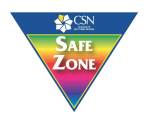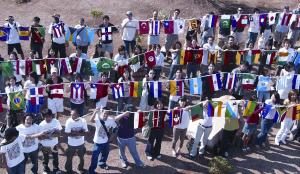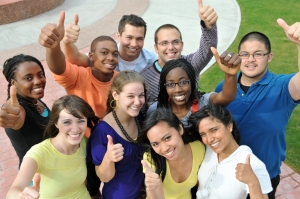Diversity Day at College of Southern Nevada provided training sessions for faculty, staff and students to increase their cultural awareness, appreciation and aptitude.
The Office of Community Relations, Diversity and Multicultural Affairs holds Diversity Day each semester.
On Oct. 16, the welcome commenced with CSN’s President Michael Richards and then seven break-out sessions followed. Two notable workshops included “Understanding socioeconomic and cultural challenges CSN students face and helping them with resources” and “DACA all-access committee presentation.” Others focused on barriers to equality, institutional equity and diverse student-learning populations.
“We want to create an inclusive environment,” said Maria Marinch, executive director of multicultural affairs. “We try to make [the workshops] as practical as possible, so when people attend the trainings, they take something with them that they can put in their toolbox.”
During the past two years of Diversity Days there have been approximately 600 participations, according to Marinch. More and more diversity issues on campus are being discussed and these trainings heighten cultural competencies.
 A session held this year shed light on the LGBTQ community. CSN’s Queer Inclusive Campus Committee gave faculty a training seminar on Safe Zone. Those trained will place Safe Zone stickers on their office windows or doors that lets students know that they can come there to get support or help.
A session held this year shed light on the LGBTQ community. CSN’s Queer Inclusive Campus Committee gave faculty a training seminar on Safe Zone. Those trained will place Safe Zone stickers on their office windows or doors that lets students know that they can come there to get support or help.
“Being openly LGBTQ is becoming more accepted at CSN, but there’s so much further to go, especially with trans women, and even further: trans women of color,” said Kalene Westmoreland, member and co-founder of QICC and one of the presenters on Safe Zone training at this semester’s Diversity Day.
In the past, sessions were held on how to assist international students, as that encompasses various diversity aspects.
Students from all over the world study at CSN. Mary Sasso, director of the International Center, said one of the goals is to help international students transition to the United States and college life.
“Our students have come from various backgrounds and various age groups, and it’s one of the challenges we face to try to meet everybody where they are, maturity-wise and needs-wise,” Sasso said.
 International students can face a multitude of struggles especially those that don’t speak English proficiently. Sasso explained that it can be difficult to be in a different culture with a new language. These students often times have trouble communicating with their professors and colleagues, which can make them seem less intelligent when in reality they’re extremely bright in their native tongue. CSN provides academic advising, tutoring and assistance to help these students.
International students can face a multitude of struggles especially those that don’t speak English proficiently. Sasso explained that it can be difficult to be in a different culture with a new language. These students often times have trouble communicating with their professors and colleagues, which can make them seem less intelligent when in reality they’re extremely bright in their native tongue. CSN provides academic advising, tutoring and assistance to help these students.
“We’ve had international students speak about their experiences and share with faculty and staff some of their tips on how to better relate to and understand their experiences,” Marinch said. These sessions are helpful to provide first-hand accounts. It makes a bigger impact.
For more information on the Office of Community Relations, Diversity and Multicultural Affairs, visit http://www.csn.edu/diversity/.




